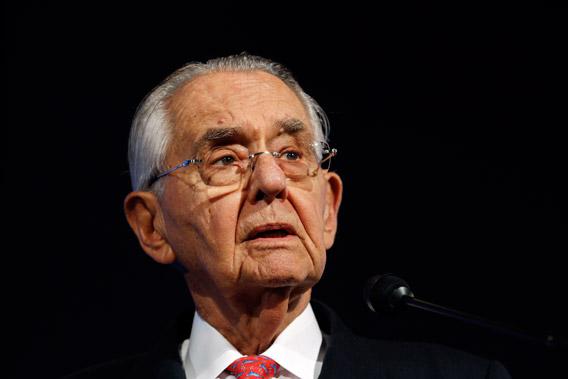Speaking of Businessweek, Josh Green has a pretty great story about the failure of Erskine Bowles, Alan Simpson, and their well-funded effort to persuade congress to cut entitlement spending in the context of a “grand bargain” on the budget deficit.
I would say that beyond Simpson and Bowles the particular problem here lies with Pete Peterson and unwillingness to ever reconsider his strategic commitment to BipartisanThink. You can see in the piece that both Simpson and Bowles are furious at the Obama administration for not endorsing their proposal. They seem much angrier at the White House over this than they are at John Boehner, who also didn’t endorse their proposal, or than they are at Paul Ryan whose non-endorsement while serving on the Simpson-Bowles Commission was the specific reason that their proposal didn’t qualify for expedited consideration on the Hill.
This is a bit curious since Obama has endorsed the general idea of a grand bargain that raises taxes and cuts entitlements while Republican leaders reject it. Now there are two cogent responses to this. One would be to drop the bipartisan schtick and call on John Boehner to show some leadership and get the grand bargain done. The other would be to drop the grand bargain schtick and just campaign for entitlement cuts. Instead they insist on endorsing the Democrats’ policy position while refusing to endorse the Democrats and help them in their political battle with the GOP. That requires a lot of BipartisanThink to devise phony disagreements with Obama and restore equilibrium. Thus the otherwise inexplicable hangup with Obama not hugging them quickly enough. What possible difference would it have made for Obama to endorse a specific policy framework that Ryan had just rejected, rather than endorsing a general policy approach that Ryan had just rejected?
It’s an axiom of the cause that both sides are equally blameworthy, so you need to make something up to explain why that’s the case. But though BipartisanThink is useful for the purposes of TV show booking and certain kinds of Beltway social situations, it’s paralyzing in terms of politically effectiveness. There’s nothing to be gained from shifting your positiion closer to the Fix The Debt view and nothing to be lost by shifting your position further from it. No matter what happens, as long as the parties don’t agree they’re equally to blame.
